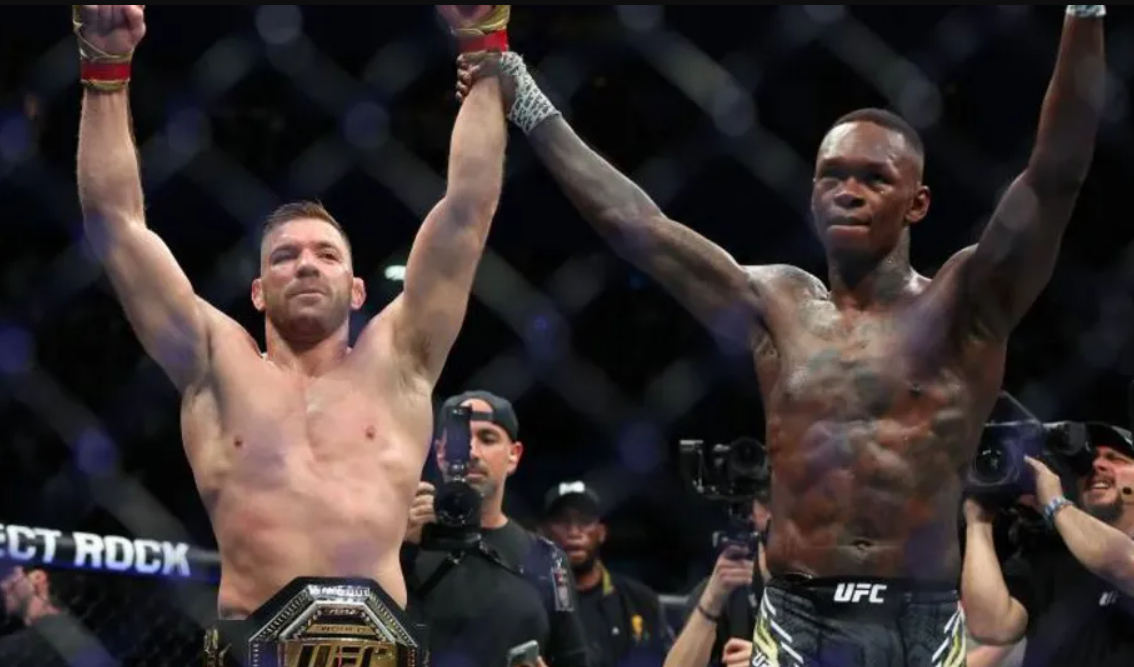Rivalry Beyond Borders: Israel Adesanya vs. Dricus du Plessis
The intense competition between Dricus du Plessis and Israel Adesanya has enthralled mixed martial arts enthusiasts throughout the world, especially in countries like Africa. Something happened a few months before their epic fight at UFC 305 that gave fresh significance to this fierce rivalry.
New Zealand-based fighter Adesanya, who is of Nigerian heritage, described an illuminating interaction with a South African supporter. As the fan rode in a taxi, he said something that captured the bigger picture of the impending battle: “When you and Dricus fight, even if you win or he wins, I feel like I win.” Adesanya treasures this shot because it captures a moment that exemplifies their complicated rivalry, which goes beyond personal achievements to reflect a greater story of African pride and identity.
A Fight Over Words and Legacy in the Building Phase
Tensions ran high leading up to the bout because of remarks made by South African fighter Du Plessis, who proclaimed himself the UFC’s “first real African champion.” His statement, which was meant to highlight his continental residency, caused quite a stir. The comment was taken exception to by Adesanya, Kamaru Usman, and Francis Ngannou, all of whom were born in Africa but had since moved outside of the continent. The buildup to the first-ever UFC championship bout featuring only African fighters reached a fever pitch during an emotionally tense news conference.
Not to downplay Adesanya, Usman, or Ngannou’s accomplishments, but to emphasize that he is the first champion to remain in Africa—a point that Du Plessis later made clear. The tension in the buildup to the battle persisted, though, because the middleweight belt wasn’t the only thing driving either competitor.
What Happened at UFC 305 and What Came Next
Perth, Australia, was the site of the fight, and it was every bit as historic as advertised. The 30-year-old Du Plessis submitted the 35-year-old Adesanya to successfully defend his middleweight belt. Although the result was clear, it was not the most important part of the match. Even though they had previously been hostile toward one other, the two combatants now conceded that Africa had won the conflict.
With the event’s significance still fresh in his mind, Adesanya declared, “Africa won tonight.” He went on to say that this win would be huge for African mixed martial arts in the future, and that Du Plessis might serve as an example to the fighters of Africa’s future, similar to how he, Usman, and Ngannou had influenced Du Plessis.
Symbolism in a Jacket: A Sign of Respect
After the fight, Du Plessis gave Adesanya his jacket, which had the South African flag on it. It was a touching gesture. Both as a small measure of appreciation and as a symbol of the fight’s larger significance, this gesture was meaningful. Du Plessis made a reference to Nelson Mandela, the legendary leader of South Africa, who had a profound belief in the ability of sports to bring people together, when he did this. Du Plessis made the comment, “Sport unites people in a way that politics can never do,” highlighting the impact of their meeting and echoing Mandela’s remarks.
Adesanya may never be a personal friend of Du Plessis’s, but he still holds Adesanya in the highest esteem as a fellow warrior. He elaborated that the jacket served as a reminder of the all-African main event, a watershed point in history that went beyond personal animosities, and a symbol of their common experience.
In the Future, the UFC Will Keep an Eye on Africa
Even though Africa has never hosted a UFC pay-per-view event, the promotion is now giving serious consideration to doing so in light of the importance of the Adesanya-Du Plessis match. While admitting the difficulties posed by different time zones, UFC executive David Shaw made it plain that he wants to bring the promotion to Africa as soon as possible, while also dropping hints about a potential 2025 event in South Africa.
The UFC 304 event in Manchester, for example, was planned to serve American audiences despite the time difference, as Shaw pointed out. An African occurrence might call for a comparable strategy. Shaw, nevertheless, stressed the need of a good first impression in Africa, suggesting that the group is giving serious thought to its choices.
Coming to a Close: A Historical Rivalry
There will never be another mixed martial arts (MMA) rivalry quite like the one between Israel Adesanya and Dricus du Plessis. Beyond the confines of the octagon, the cultural and symbolic significance of their UFC 305 encounter will ensure its place in history. This competition will undoubtedly have an impact on the sport and motivate future African athletes as the UFC considers Africa as a potential destination in the future.



















